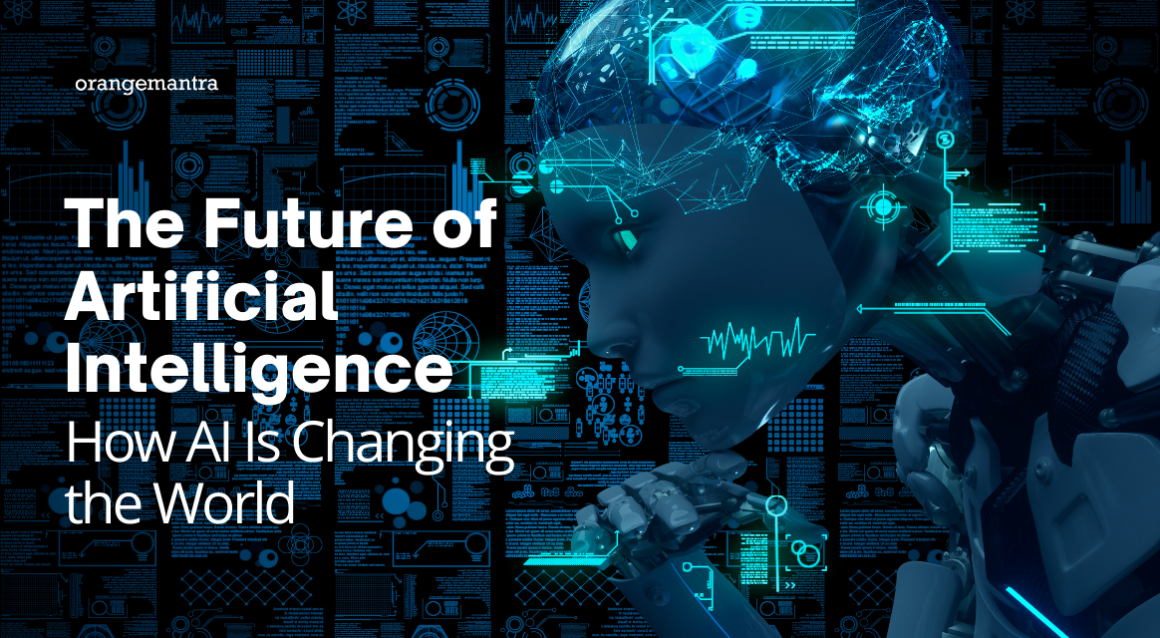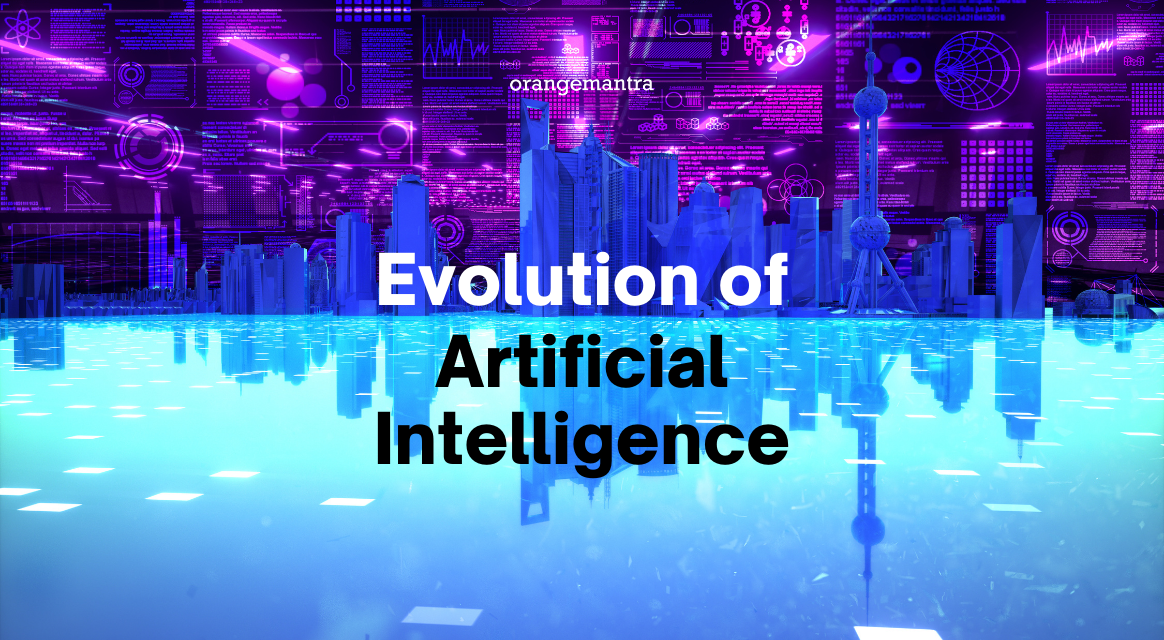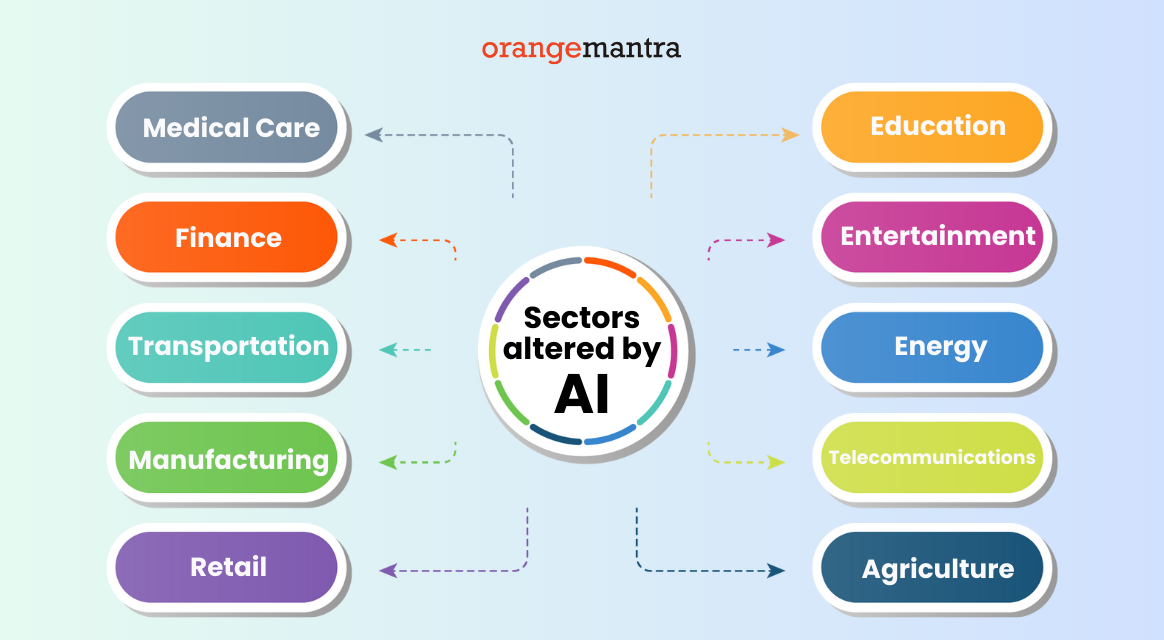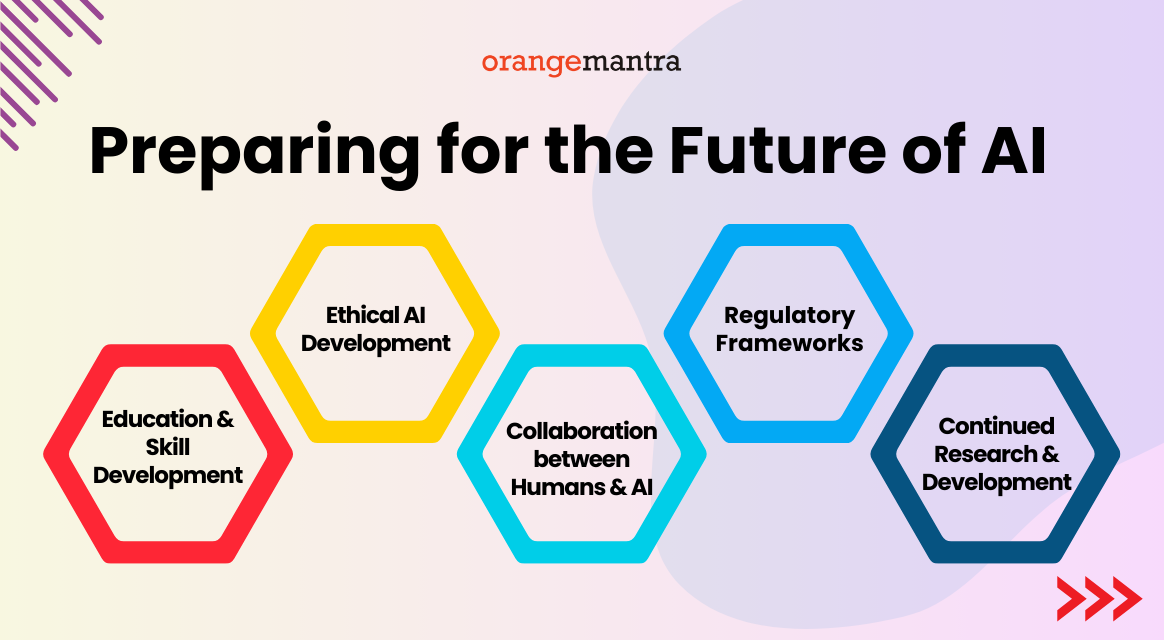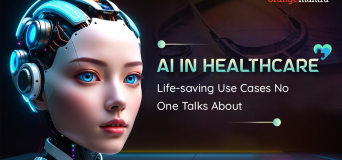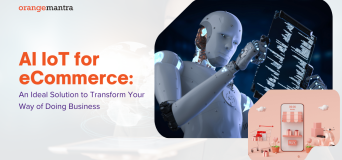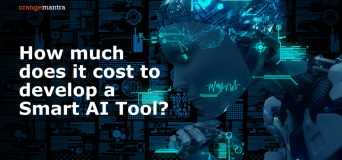Artificial Intelligence (AI) has become an integral part of our society, surpassing its conceptual boundaries and becoming a force to be reckoned with. It is a constantly changing and expanding field. Over the last ten years, artificial intelligence (AI) technology has advanced at an astounding rate. This growth has not only captured the interest of technophiles but also sparked passionate debates and theoretical conversations about the future of AI. These discussions are more than just guesswork; they are a sincere effort to unravel the complex mystery of what lies ahead for us in the next few chapters of this revolutionary technological story.
Introduction
This blog sets out on an ambitious adventure to uncover the layers upon layers of complexity that make up artificial intelligence (AI) in the future in the spirit of this exploration. By means of a thorough and detailed analysis of its evolutionary history, we hope to navigate the narrow roads that have brought us to this point of no return. In parallel, we explore the depths of the hopes that were cultivated ten years prior, removing the layers of conjecture to reveal the complex realities that have come to pass. We will examine the enormous effects that AI technology is having on a variety of industries, including healthcare, banking, and education, as we make our way through this intellectual terrain.
However, our trip doesn’t end without looking back. In anticipation of the impending transformations that artificial intelligence will bring about in the future, we broaden our investigation to include preparatory approaches. Equipped with insight and anticipation, we examine the plans and structures required to deal with the changes that are coming. Our goal is to give our readers the most thorough grasp possible of the impending future of AI, realizing that only with this kind of knowledge will we be able to properly navigate and shape the future that lies ahead of us.
The Future Of Artificial Intelligence
As we delve into the exploration of the future scope of artificial intelligence, it is crucial to acknowledge the role of AI development companies in shaping this landscape. Companies specializing in AI development, Enterprise AI development, and machine learning development play a pivotal role. Additionally, the integration of AI in various sectors, such as AI in education, AI in fintech, and the utilization of Natural Language Processing services, is transforming the way we interact with technology.
Moreover, considering the global impact, we also shed light on the importance of AI in the future, emphasizing its role in shaping not only technological landscapes but also economies and societies. Particularly, the discussion extends to the future of artificial intelligence in India, exploring the country’s position and potential contributions in the evolving AI landscape. This comprehensive journey aims to provide a holistic understanding of the multifaceted facets of the future of AI.
The Evolution of AI
1- The Dartmouth Conference (1956): Inception of AI
The evolution of artificial intelligence (AI) is a fascinating journey that began with the Dartmouth Conference in 1956, marking the inception of this transformative field. Here, the phrase “artificial intelligence” was first coined, setting the stage for the subsequent developments. In its early phases, AI heavily relied on rule-based systems and symbolic thinking, attempting to replicate human intellect through explicit rules and logical programming.
2- Challenges in Early Phases: The AI Winter
However, early problems with AI hindered its progress, and the “AI winter” ended. A increasing realization that creating true artificial intelligence would be more challenging than initially believed emerged during this period of waning enthusiasm and funding. The practicality of the field was questioned when the drawbacks of rule-based techniques became apparent.
3- Revolutionary Phase with Machine Learning and Deep Learning
With the introduction of machine learning and deep learning in the twenty-first century, AI research entered a revolutionary new phase. Artificial intelligence (AI) systems can now learn from data and continuously enhance their performance, all thanks to machine learning algorithms. Due to their demonstrated ability to handle challenging tasks, algorithms—particularly neural networks, which were designed after the structure of the human brain—became more and more popular.
4- Crucial Catalysts: Large Datasets and Processing Power
The availability of large datasets and breakthroughs in processing power served as crucial catalysts for previously unheard-of advances in artificial intelligence. Together, these elements enabled neural networks to explore complex patterns and connections in data, which was not possible with previous rule-based systems.
5- Milestones in AI: Triumphs of Deep Blue and AlphaGo
AI’s application to computers and strategic decision-making was demonstrated by IBM’s Deep Blue’s 1997 triumph over chess master Garry Kasparov. 2016 saw Google’s AlphaGo defeat world champion Lee Sedol in a historic encounter, more than two decades after the game of Go was created. These innovations ushered in a new phase of research and development while demonstrating the adaptability and problem-solving capabilities of AI technology.
The Intriguing History of Artificial Intelligence
-
Ancient Musings and the Birth of AI
The history of artificial intelligence (AI) is a fascinating journey that blends technological advancement with human inquisitiveness. Its origins can be traced back to the philosophical musings of ancient Greek scholars such as Pythagoras and Aristotle. These forward thinkers delved into the complexities of human cognition and the potential for crafting artificial entities that could mimic human comprehension.
Their philosophical contemplations, driven by an enduring fascination with human intelligence, served as the cornerstone for centuries of profound contemplation and hypothesis. This era signifies the nascent phase of AI, wherein the notion of replicating human cognitive capacities took its initial form.
-
The Awakening of the 20th Century
The 20th century marked the commencement of modern AI’s evolution. In the 1950s, a pioneering assembly of computer scientists, guided by the capable Alan Turing, initiated the establishment of the artificial intelligence framework. Alan Turing’s groundbreaking concept, the Turing Machine, profoundly influenced our perception of computers, algorithms, and AI, thus serving as the pivotal starting point for the creation of versatile computers. This era represented a crucial juncture in AI’s journey, shifting it from abstract philosophical pondering to practical scientific exploration.
The Dartmouth Conference: A Watershed Moment
In the middle of the 20th century, notably in 1956, artificial intelligence as a field of study truly emerged. John McCarthy organised the famous Dartmouth Conference around this time, which brought together eminent experts to discuss the idea of artificial intelligence.
This symposium served as both a catalyst for the development of the phrase “artificial intelligence” and a turning point in AI research. It was a significant advance that started an era of invention and discovery and cemented artificial intelligence’s place in the annals of scientific history.
Early AI Endeavours and Rule-Based Systems
The following years were marked by unbridled optimism in AI research. The focus shifted to the development of computer programs capable of emulating human thought processes. This encompassed endeavors like problem-solving and language translation, considered integral aspects of human intelligence.
During this period, AI projects such as the Logic Theorist and the General Problem Solver came to the forefront. They laid the groundwork for the development of expert systems and rule-based AI, opening up new possibilities for emulating human cognition through machines.
The AI Winter and Struggles
The 1970s and 1980s ushered in a phase often referred to as the “AI winter.” This was a period of tempered enthusiasm in the history of AI, characterized by unrealistically high expectations and challenging technical limitations. The field faced a substantial test, as the reality of AI fell short of the lofty goals set for it.
However, it’s vital to acknowledge that even during this challenging period, AI continued to evolve. Researchers explored various forms of AI, leading to notable advancements in expert systems and neural networks, demonstrating the indomitable spirit within the AI community.
The Renaissance of AI
AI experienced a resurgence in the latter half of the 20th century, spurred on by important advances in machine learning and the accessibility of enormous datasets. AI systems made incredible strides after deep learning was introduced, supported by potent GPUs and neural networks.
These AI systems performed superbly across a wide range of tasks, including natural language processing, voice understanding, and image identification. This revival denoted a new high point in artificial cognition, constituting a significant turning point in the development of artificial intelligence.
AI in the 21st Century and Integration into Daily Life
In the twenty-first century, AI seamlessly assimilated into our everyday existence. The ubiquity of recommendation systems, tailored marketing, autonomous vehicles, and virtual assistants such as Siri and Alexa has become unremarkable. AI’s prevalence in our daily routines is now attributed to the machine learning algorithms powering social media timelines, search engines, and other algorithmic processes.
Consequently, AI has transformed convenience, efficiency, and accessibility, solidifying its status as an indispensable component of our daily lives. This era represents the latest chapter in the enduring narrative of AI’s integration into society.
Unlimited Potential and Shaping the Future
AI is currently undergoing constant development and is positioned to have an unparalleled impact on society and industry. It is a field driven by the constant quest to imitate human reasoning and problem-solving abilities. The potential uses of AI are endless, with the power to completely reimagine the direction of technology. From chatbots and self-driving robots to language translation and medical diagnosis, AI has the capacity to change everything.
The continuous advancement of AI reflects humanity’s steadfast dedication to pushing the boundaries of what is conceivable. It’s a narrative characterized by persistence, ingenuity, and an unswerving pursuit to fathom and replicate the intricacies of human cognition. In the perpetually expanding saga of AI, the realms of potential appear more extensive than ever as we find ourselves on the verge of a future steered by AI.
AI’s Impact Today: A Multifaceted Influence
These days, AI is influencing innovation in many different fields and has impacted many facets of our daily life. Computer vision enables picture and video identification, while natural language processing (NLP) powers voice-activated virtual assistants like Siri and chatbots. Behavioral psychology-inspired reinforcement learning enables AI systems to pick up on interactions and make decisions in dynamic environments.
What Did the Future of AI Look Like 10 Years Ago?
1- Anticipation in the Early 2010s: Hopes and Possibilities
The field of artificial intelligence (AI) was cloaked in hopes and possibilities in the early 2010s, and conversations about the subject tended to focus more on its potential than on actual uses. AI was predicted by both enthusiasts and professionals to surpass its current limitations in the future, enabling the development of highly autonomous systems, individualized AI assistants, and revolutionary breakthroughs in important domains like healthcare and education.
2- Customized AI Assistants: A Vision of Personalization
Many were optimistic about the future, seeing Artificial intelligence vs human intelligence that would improve productivity and expand human potential. The idea of customized artificial intelligence assistants—AI systems that can comprehend and react to human requests and tasks—became popular. In addition to streamlining repetitive chores, these assistants were intended to adjust to unique tastes and behaviors, resulting in a more personalized and natural user experience.
3- Predictions for AI in Healthcare and Education
In addition, everyone was expecting to see major advancements in AI-powered healthcare and education. Artificial intelligence (AI) was predicted to transform drug research, treatment planning, and diagnosis in the healthcare industry, possibly resulting in more precise and tailored medical interventions. In the same way, AI was expected to be essential to customized learning experiences in education, adjusting to each student’s particular needs and preferred method of learning.
4- Realization of Predictions: Present-Day Insights
When we look ahead to the present, some of these predictions have come true, even though they haven’t happened as rapidly or to the amount projected. Two voice-activated virtual assistants that are gaining popularity and are easily integrated into mobile devices and smart homes are Siri and Alexa. These artificial intelligence beings are not limited to note-taking and message sending; they can even hold normal language conversations—a feature that was formerly thought to be futuristic.
5- The Reality of Self-Driving Cars and Their Impact
Self-driving automobiles, which were mostly the subject of science fiction for many years, are now a reality. Thanks to businesses like Tesla, Google’s Waymo, and others, the technology pertaining to autonomous vehicles has advanced to the point where many contemporary cars are outfitted with self-driving features.
These technologies are not only altering the vehicle industry but also impacting global transportation and urban planning systems.
6- AI’s Impact on Various Industries
In many jobs, AI systems have equaled and occasionally outperformed human performance. Machine learning models demonstrate the extraordinary progress made in a relatively short time by excelling in picture recognition, language translation, and playing challenging games. These accomplishments highlight how AI is revolutionizing a variety of areas, including technology, finance, healthcare, and manufacturing.
7- Challenges and Ethical Dilemmas in AI Development
But as artificial intelligence has developed, so too have the difficulties and moral dilemmas posed by its broad use. Bias in AI systems has become a major concern, especially for those systems that were trained on biased datasets. Increased openness and ethical AI development procedures are being called for because of the technology’s potential to reinforce preexisting biases and worsen societal inequality.
8- Navigating the AI-Driven Future: Employment and Ethical Considerations
Ten years after it was first raised, the issue of job displacement is again dominating conversations about what employment will look like in an AI-driven future. Artificial intelligence (AI) has the power to both create new employment and eliminate current ones because it can automate some activities. Managing the AI-driven future requires ensuring a seamless transition and educating the workforce about the dynamic nature of the labor market.
Ethical frameworks have been developed in response to issues about algorithmic accountability, data privacy, and appropriate use of AI in decision-making. These concerns have received attention. AI systems are growing more and more powerful, thus it’s critical to use them in a way that is just and acceptable to society to avoid unintended effects and harm.
9- Balancing Innovation and Responsibility in AI Development
In conclusion, in many respects, the AI future that was predicted ten years ago is now a reality. With artificial intelligence (AI) technology penetrating many facets of our lives, the rate of development has been both thrilling and difficult. Although the accomplishments are admirable, it is still critical to address the new issues, which include prejudice, employment displacement, and ethical issues. Finding a balance between innovation and responsible development is essential as we continue to traverse the rapidly changing field of artificial intelligence to make sure that technology advances humanity and has a good impact on the future.
Sectors altered by artificial intelligence
Artificial intelligence (AI) is becoming a disruptive force that is revolutionizing many different industries through the automation of processes, AI that fosters innovation, and the improvement of human capabilities. Artificial intelligence has a big influence; it changes traditional approaches and opens up new possibilities for efficiency, precision, and growth. Let’s examine the many industries that have seen significant transformation because of AI deployment.
-
Medical Care
AI is advancing healthcare remarkably, from diagnosis to customized treatment regimens. To aid in the diagnosis and detection of diseases, machine learning algorithms examine large datasets, such as imaging and medical record data. Robotics driven by AI helps in surgery, improving accuracy and speeding up recuperation. By supporting patient care and medication adherence, virtual health assistants help to improve the efficiency of healthcare delivery.
-
Finance
Artificial Intelligence (AI) is transforming the financial industry by boosting fraud detection, streamlining regular activities, and managing risk better. Artificial intelligence systems examine market patterns and offer guidance on investment choices. Robo-advisors provide clients with individualized financial advice by utilizing machine learning. AI applications in finance increase efficiency, which improves decision-making and lowers costs.
-
Transportation
The transportation sector is undergoing a transformation thanks to AI algorithms driving autonomous vehicles. Businesses that are heavily investing in self-driving technology include Tesla, Waymo, and Uber. AI improves logistics, traffic control, and route optimization, resulting in more effective and environmentally friendly transportation systems. AI-powered predictive maintenance guarantees the dependability and security of automobiles.
-
Manufacturing
Automation powered by AI is transforming manufacturing processes, increasing productivity, and lowering errors. By foreseeing equipment problems, machine learning-powered predictive maintenance reduces downtime. In manufacturing plants, collaboration between human workers with robotic and AI-powered systems boosts productivity and quality. AI-powered supply chain optimization guarantees more efficient inventory control and logistics.
-
Retail
The retail industry is witnessing a shift in consumer purchasing behavior because of artificial intelligence. Machine learning-powered recommendation engines look at client preferences to deliver personalized product recommendations. Chatbots with artificial intelligence (AI) capabilities provide prompt and efficient answers to inquiries, enhancing customer support. By reducing the possibility of stockouts and overstocks, demand forecasting enhances inventory management.
-
Education
Personalized learning experiences brought about by AI is revolutionizing education. Intelligent tutoring programs provide tailored help and feedback based on each student’s needs. Language acquisition is aided by natural language processing, and AI-powered analytics assist teachers in pinpointing areas in need of development. Immersion learning environments are improved by virtual reality and augmented reality, which are frequently powered by AI.
-
Entertainment
AI has a big impact on the entertainment sector; it helps with everything from creating individualized user experiences to content development. For the purpose of recommending movies, music, and other content, algorithms examine consumer preferences. AI-powered technologies for content creation help with writing, art, and even music production. AI-powered virtual influencers are becoming more and more common in social media and marketing.
-
Energy
AI is essential to the energy sector because it helps detect equipment breakdowns, optimize power networks, and increase energy efficiency. To improve predictive maintenance in power plants, machine learning algorithms evaluate data from sensors and Internet of Things devices. Artificial intelligence (AI) powered models help anticipate renewable energy and optimize grid integration of wind and solar power.
-
Telecommunications
In the telecommunications sector, artificial intelligence plays a key role in improving customer service, predictive maintenance, and network performance. In order to detect and prevent problems before they arise, intelligent algorithms examine network data. Artificial intelligence (AI)-powered virtual assistants offer prompt customer help, enhancing overall service quality.
-
Agriculture
AI-driven technologies are transforming farming techniques through precision agriculture. Drones with AI-enabled cameras track crop health, allowing for focused interventions. To optimize planting and harvesting dates, machine learning algorithms examine historical patterns and meteorological data. By maximizing yields and reducing resource consumption, AI helps promote sustainable farming techniques.
The way AI has revolutionized these disparate industries attests to its adaptability and promises to bring about good change. Industry changes will probably be even more significant as AI technologies advance, bringing with them new opportunities and difficulties that will influence how people work and innovate in the future. It is still essential to strike a balance between ethical issues and technical advancement to guarantee that AI is used ethically and to society’s advantage.
Preparing for the Future of AI
To be ready for the significant changes and difficulties that artificial intelligence (AI) future will bring, people, businesses, and governments must adopt a diversified strategy as AI continues its rapid progress. The following fundamentals provide a thorough roadmap for negotiating the AI future:
1- Education and Skill Development
Upskilling and reskilling are critical as automation changes traditional employment responsibilities. It becomes increasingly important to foster expertise in fields like data science, programming, and AI ethics. Institutions of higher learning and training must change to provide people with the ethical and technical skills needed in the dynamic labor market. The focus must be on developing a workforce that can operate together with AI technology in an efficient manner, enhancing each other’s areas of strength.
2- Ethical AI Development
The fundamental tenets of responsible AI development are openness, equity, and impartial decision-making. Throughout the AI development lifecycle, ethical considerations must be given top priority by developers and companies. This entails tackling problems with prejudice and discrimination in AI algorithms, making sure AI systems follow moral guidelines, and encouraging inclusivity in their design. To reduce potential hazards and increase public confidence in AI technologies, ethical frameworks and rules must be established.
3- Collaboration between Humans and AI
AI and humans can collaborate to produce more successful results rather than viewing AI as a threat to employment. When monotonous and repetitive activities are replaced by artificial intelligence (AI). Human workers can concentrate on more intricate, imaginative problem-solving and emotionally charged labor. Organizations must adopt this collaborative paradigm by changing their perspective, viewing AI as a tool that will enhance human strengths rather than take their place. Employees should aim for lifelong learning in addition to learning how to adjust to new technologies.
4- Regulatory Frameworks
Governments and international organizations play a major role in establishing strong regulatory frameworks for artificial intelligence. These frameworks ought to address ethical dilemmas, data privacy, and security. Laws can set standards for the moral advancement and use of AI, ensuring that these technologies uphold social norms and respect people’s rights. Creating a legal framework that promotes the appropriate use of AI technologies requires fostering innovation while protecting human wellbeing.
5- Continued Research and Development
To increase the range of what is possible, AI research must get ongoing support. AI will become more creative due to technological advancements, which will also ensure that AI will ultimately benefit society. This means supporting educational institutions, funding research projects, and promoting collaboration between industry and academics. Artificial intelligence (AI) research can result in the development of more efficient algorithms, a deeper understanding of the moral implications of AI, and the exploration of cutting-edge uses that could be advantageous to numerous businesses.
Individuals, groups, and governments can all work together to get ready for the AI of the future by addressing five essential elements. To maximize AI’s advantages while reducing any potential concerns, proactive and cooperative approaches are crucial. This will guarantee that AI will continue to be an effective weapon for societal growth in the future. A dedication to moral standards, ongoing education, and responsible innovation will be essential as we negotiate the rapidly changing field of artificial intelligence. These traits will help to shape a future in which AI is in line with human values and goals.
Navigating Tomorrow: AI’s Journey into Our Future
1- AI’s Developmental Journey: A Retrospective
In summary, artificial intelligence (AI) appears to have a great deal of promise and potential in the future, but there are certain issues as well that need to be carefully considered. Navigating the future’s difficulties requires an understanding of AI’s developmental path from its inception to its revolutionary status now. A ten-year retrospective of projections demonstrates the rapid and unpredictable pace of AI progress, with a technological trajectory that has not only met but often exceeded expectations.
2- Proactive Planning for the Future of AI
Proactive planning for AI’s future becomes crucial to ensuring a seamless integration of this ground-breaking technology into our daily lives. This readiness requires an awareness that artificial intelligence (AI) is a social force requiring moral and responsible action. AI is more than just a marvel of technology. We can successfully navigate the future by making the most of AI for the good of society. This means fostering the development of moral AI, empowering individuals with the necessary educational skills, and forming a cooperative alliance between humans and AI to maximize productivity and creativity.
3- Critical Aspects of AI Integration: Transparency, Equity, and Inclusivity
As AI becomes more and more ingrained in our daily lives, it is critical that we approach its implementation with a deliberate commitment to transparency, equity, and inclusivity. Addressing the issues of racism, employment displacement, and ethical problems becomes morally required because they cannot be disregarded. To protect individual rights and society values while ensuring the responsible development and use of AI. Governments and international organizations must take the lead in putting in place strong regulatory frameworks.
4- The Changing Landscape of AI’s Future
To put it simply, AI’s future is a changing landscape that calls for caution and proactive thinking. Optimistic about the revolutionary possibilities of artificial intelligence. We as a society must direct its course. To bring about a time when progress in technology is in line with the welfare of humanity. Through accepting the way AI is developing, thinking back on the lessons learned from the past. And actively planning for the changes that lie ahead. We may start along a path that not only harnesses AI’s potential to improve society. But also guarantees a future in which innovation and morality coexist.
Conclusion
In conclusion, AI in 2024 and beyond holds multiple opportunities and potential to transform our world. Whether it is bringing automation for industries and enhancing efficiency to address complex challenges or human capabilities, AI is the most significant emerging technology to admire. However, as we leverage the opportunities of AI, it is important to address the ethical challenges, mitigate risks,
and ensure that AI technologies are responsibly developed and deployed for society. Making optimum use of AI innovation while ensuring ethical standards, you can enjoy a brighter and more sustainable future powered by Artificial Intelligence technology.
Frequently Asked Questions
1. What is AI and why is it important in 2024?
AI, or Artificial Intelligence, is all about simulation of human intelligence in machines. It programmed to think and respond like humans. In 2024, AI has an important role in transforming and automating various industries, including healthcare, finance, transportation, and more.
2. How is AI being used in different sectors in 2024?
AI is already serving different industry sectors and its usage will grow at an exponential rate in 2024. For example, AI is helping healthcare industry with medical diagnosis, drug discovery, and personalized treatment. AI in BFSI sector is performing fraud detection, risk assessment, and providing investment tips. AI in transportation, is powering autonomous vehicles, traffic management systems, and logistics optimization.
3. What are the ethical considerations regarding AI development and deployment?
Ethical considerations that need to be kept in mind with AI include concerns about data privacy, algorithmic bias, job concerns, autonomous weapon systems, and more. It is important for developers, government agencies, and society as a whole to keep a check on these ethical concerns responsibly.
4. What are the potential risks and challenges associated with AI adoption?
Risks and challenges that need to be addressed when implementing AI services include job loss, cyber attacks, misuse of AI for fraud activities, and making biased or unethical decisions.
5. What are the future trends for AI technology beyond 2024?
Like 2024, AI will experience continuous advancements in the next few years. The presence of enhanced natural language processing capabilities, smart integration of AI with IoT devices, advancements in healthcare technologies, and enhanced adoption of AI in daily operations.
